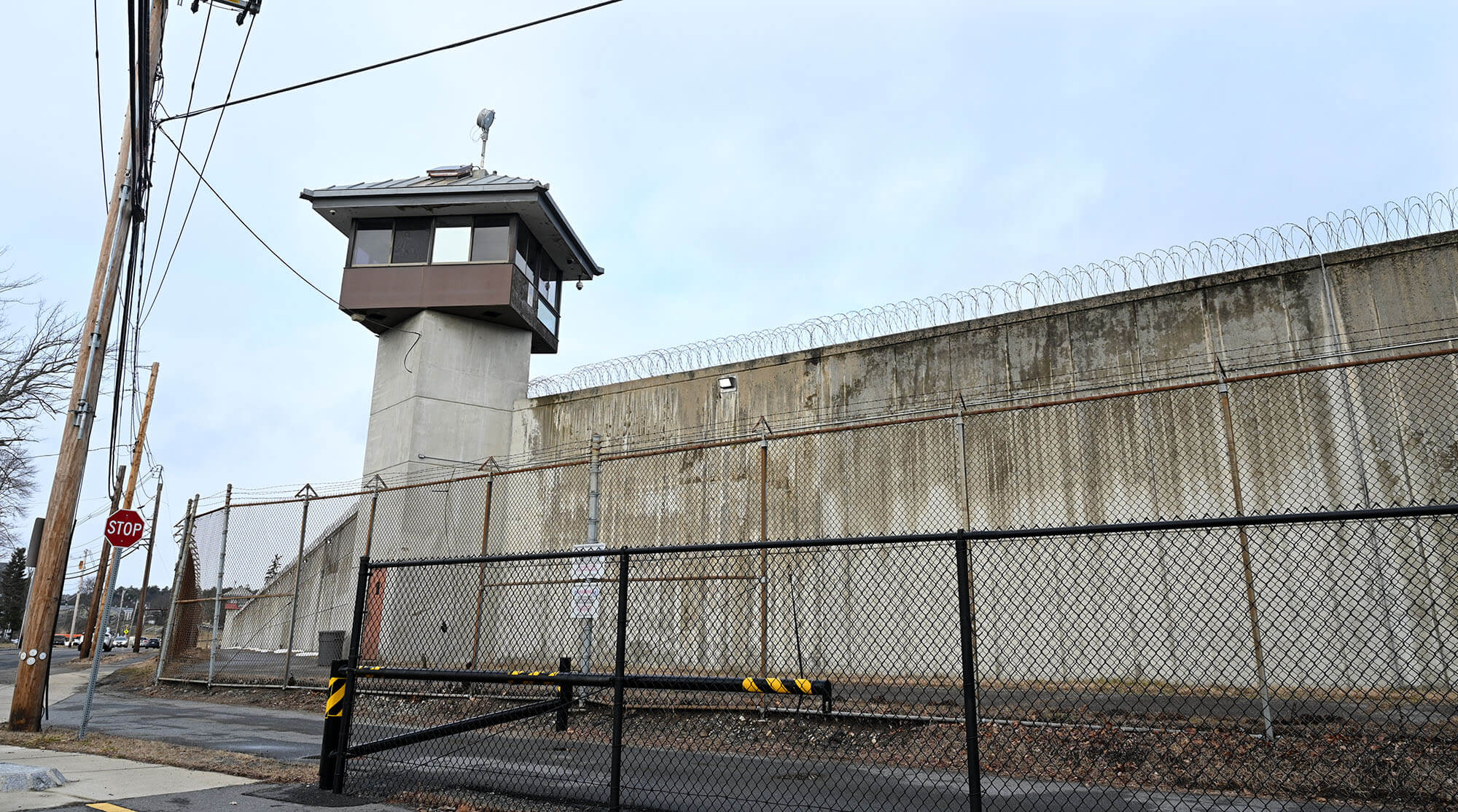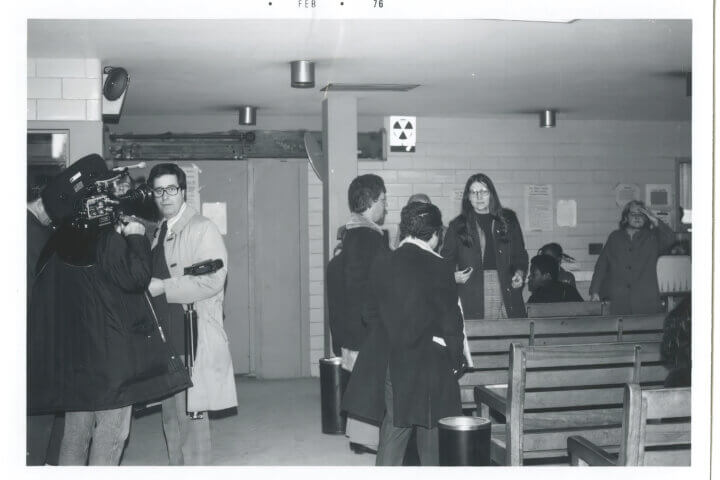As news of the impending closure of MCI-Concord filtered out the evening of January 23, the initial shock coalesced into a single question: why wasn’t the town notified sooner?
While officials are eager to explore the myriad potential local benefits of the MCI-Concord closure, several said they wished they’d known about the plan — and maybe even had a chance to contribute to its formation — before the news went wide.
The 146-year-old lockup, the oldest running men’s prison in the state, will be transferring its population and correctional officers to other facilities over the next few months. It is expected to shutter by the summer.
The closure will not affect the minimum security Northeastern Correctional Center, which is across the rotary from its more intimidating counterpart.
Select Board Chair Henry Dane called it “sort of surprising that the state would come up with a proposal affecting a particular town with so little consideration or consultation with the locality that would be seriously affected by that proposal.”
Speaking at the most recent Select Board meeting, which included Deputy Town Manager Megan Zammuto’s overview of the town’s role and interest in the prison’s future, Dane continued, “It’s not the same as some program that affects the whole state at large.
“It would be something that very specifically affects this town,” Dane said, “and I would have expected at least a courtesy to do some advance planning and setting up a process for dealing with it before it [was] just announced as a proposed reality.”
Select Board member Terri Ackerman chimed in, “That’s a really good point, and I felt the same way about the shelter, so this is interesting,” she said, referring to the Commonwealth’s decision about a year ago to establish the Best Western motel property on Elm Street as emergency housing.
“It seems like they might be really great projects, but we would probably have an even better project if we had some input and some discussion,” Ackerman said. “We’re not opposed to these things, but we would like some advance input and communication.”
Joked Dane, “What we’re learning is how difficult it is to deal with a government.”
In a detailed response to a questions from The Concord Bridge about the timing of the announcement, Town Manager Kerry Lafleur said “while there have been no prior discussions about the closure of MCI-Concord, we have been aware of the declining number of inmates housed there, [through] our continued discussions with DOC’s Division of Resource Management, relative to our interest in the on-site wastewater treatment plant.”
Lafleur said she got the news of the closure plan on the evening of January 23 from the Executive Office of Public Safety and Security, which was also busy informing Concord’s state legislators. Gov. Maura Healey made a formal announcement to the public while outlining her fiscal year 2025 budget the following day.
Rep. Simon Cataldo (D-Concord) similarly told the Bridge that “staff at the Executive Office of Public Safety & Security called me the evening before the administration announced that the MCI-Concord closure language would be included in the Governor’s proposed budget for FY25.”
Cataldo said he “respected the fact that the information would be embargoed until the following day due to the public safety and operational considerations involved in making a prison closure announcement. During the phone call, I shared the Town Manager’s phone number with EOPSS staff and they notified her immediately.”
Since then, Cataldo said, “I’ve been in active communication with the administration, town officials and interested constituents about the path forward.”
State Sen. Michael Barrett, who first informed the Bridge of MCI-Concord’s impending closure on the evening of January 23, said “an announcement like this truly is an announcement, an intention to proceed.”
That being said, “the legislature still has to approve it,” Barrett said. “It’s not a fait accompli.”
Also in the mix: The Massachusetts Correction Officers Federated Union is protesting the proposed closure, contending that it will put officers’ safety at risk: “We don’t know if they want to say ‘no,’ or if they want to say, ‘yes, but,’” Barrett said.
Rep. Carmine Gentile (D-Sudbury) said he wasn’t too surprised when he got a call from the administration about the closure of MCI-Concord the night before it was announced.
“It’s normal operating procedure in the legislature as well as the governor’s office to notify representatives in affected districts about a measure that is in a bill or budget just before it is introduced,” Gentile said.
He said he contacted Cataldo later that evening: “It’s a team effort,” Gentile said. “It’s a terrific piece of property, and a wonderful opportunity for redevelopment.”
Closing the prison will save the commonwealth around $16 million annually, Healey said when she outlined the FY25 budget. The town of Concord receives about $120,000 annually in state payment in lieu of taxes, or PILOT funding, for the prison.
Healey’s office and the Department of Correction did not immediately respond to requests for comment from The Concord Bridge.
While Concord is still delving into how the coming closure of its state prison will affect the local economy and budget, it appears it won’t make a huge difference in terms of its short-term impact on emergency and health services.
Shuttering MCI-Concord will mean a reduction of just 20 to 30 calls per year for the Fire Department, which also conducts two annual inspections, town Communication Manager Donna McIntosh said. The closure will also have “no routine impact” to the Concord Police Department.
And since MCI-Concord is “is currently inspected and receives enforcement of the State Sanitary Codes from the Community Sanitation Program” of the state Department of Public Health, the closure also won’t affect the local Health Department, McIntosh said.
This marks the second prison shutdown in the state in recent years: In April 2022, the state began the process of shutting down MCI-Cedar Junction in Walpole.
Lafleur also said she spoke to Lt. Governor Kim Driscoll after the news broke.
The town manager said she “expressed the Town’s strong interest in partnering with the Commonwealth regarding future use/redevelopment of the property, and for the opportunity to acquire the [wastewater treatment plant],” which she said Driscoll “remembered was of specific interest to Concord.”
The lieutenant governor, “expressed an interest in seeing some of the property redeveloped for housing, in keeping with the Administration’s goals, but understood that the highest and best use for at least some of the site would be for commercial,” Lafleur said.
“I did invite her to visit Concord and we agreed to talk further in February but have yet to schedule a specific time.”
Other Select Board members had mixed reactions to the way the announcement came down — and the opportunities it might present to Concord.
Asked whether she was concerned about how local officials got news of the impending prison closure, Select Board Linda Escobedo told The Bridge, “We’ve known for some time that MCI was operating well under its full capacity.”
Over time, “the town and some of its officials have taken the opportunity to express some of our municipal challenges to both our legislators and Governor’s cabinet and staff,” Escobedo said.
“Likewise, we are aware of many of the challenges before them, and not necessarily privy to what will be asked of us and other municipalities to address identified issues and when that might be. On two of those issues, I guess we’ve found out!”
In a separate exchange with The Bridge, Select Board Clerk Mary Hartman said it didn’t bother her “that the governor did not contact the town before filing her budget bill with the legislature.
“The town had expressed interest in the prison’s wastewater treatment capacity and the governor has a budget problem. This could be a win-win,” Hartman said. “It’s the state’s responsibility to do things towns and cities can’t do by themselves.”
Board member Mark Howell also said he’s looking forward “to engaging with the state to work out the future.”





